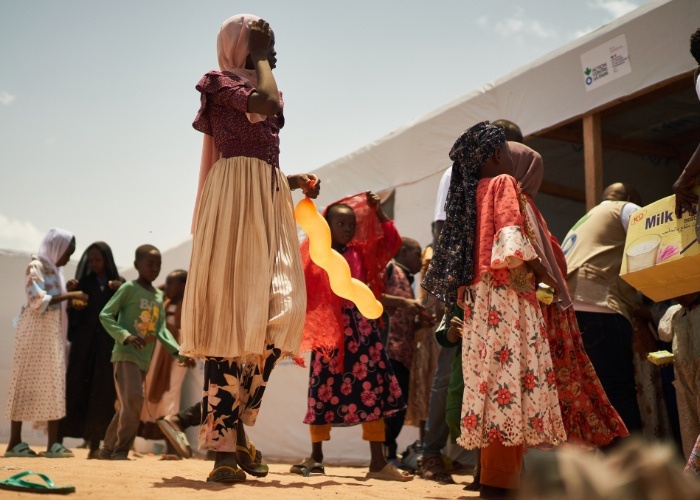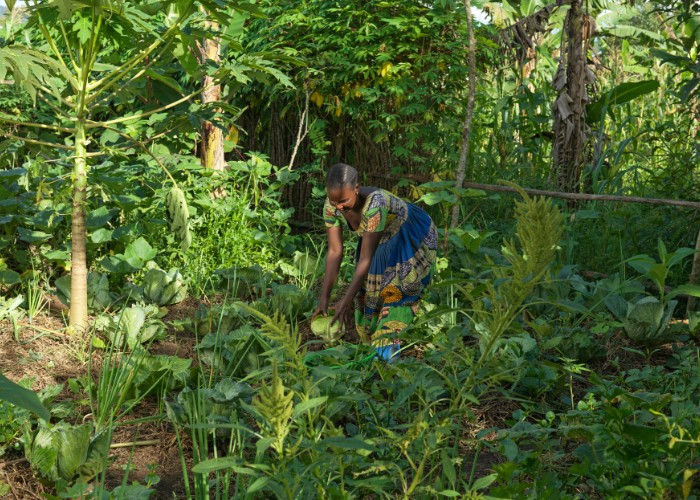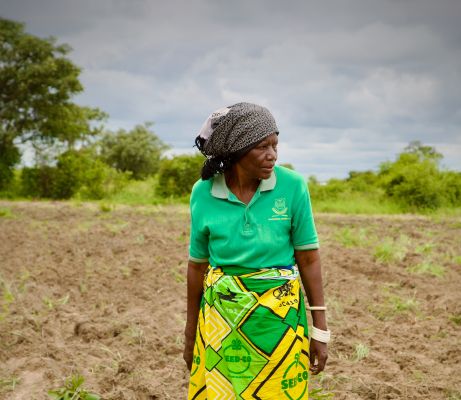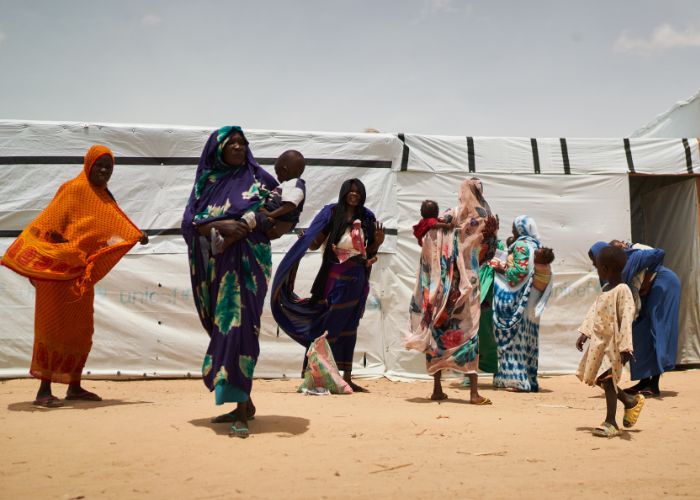Hunger is at crisis levels in countries across the globe – but where is food insecurity highest? According to the latest UN Hunger Hotspots (November 2025), the countries most at risk of hunger are:
- Countries with highest concern: Sudan, Occupied Palestinian Territories, South Sudan, Haiti, Mali, Yemen and Afghanistan
- Countries with very high concern: Democratic Republic of Congo, Myanmar, Nigeria, Somalia and Syria
- Other hunger hotspots: Burkina Faso, Chad, Kenya and Rohingya refugees in Bangladesh
In the hungriest countries where the UN has identified the highest concern, either:
- people are at risk of famine or famine has been declared and hunger is at catastrophic conditions
- hunger is getting worse and approaching catastrophic conditions
When hunger is catastrophic, at least 1 in 5 households have an extreme lack of food and basic necessities and starvation and death are at extremely high levels.
Hunger is at emergency levels when people can’t meet their daily food needs and there’s widespread malnutrition and death, or when households can only get enough food with the help of emergency support.
Crisis levels of hunger are met when households can’t meet their daily food needs and those gaps are reflected by high malnutrition rates, or people are getting just enough food to survive – but only by sacrificing their livelihoods.
World’s hungriest countries
The latest UN report has declared the countries with the worst hunger in the world as:
- Sudan
- Occupied Palestinian Territories
- Afghanistan
- Yemen
- South Sudan
- Haiti
- Mali
Learn more about the hunger situation in the hungriest countries in the world below and explore the key drivers of hunger and malnutrition in each country.
Sudan
Approximately 24.6 million people in Sudan were projected to face crisis-phase food insecurity or above between December 2024 and May 2025, with projections of:
- 637,000 people facing catastrophic hunger
- 8 million people facing emergency hunger
Famine-level food insecurity is present in at least five regions of Sudan – mostly in North Darfur. The UN is projecting that five more areas in North Darfur will face famine, as well as 17 other areas across Sudan.
Hunger is worse for women and girls in Sudan, as social norms leave them with limited control over resources. Since conflict escalated in April 2023, 73% of women in Sudan haven’t had access to enough food to stay healthy.
Women and girls also face risk of gender-based violence when accessing food at markets and humanitarian sites.
Causes of hunger in Sudan
- Escalating conflict: 9.8 million people have been internally displaced, losing their livelihoods and income
- Economic crisis: armed violence is driving high inflation, causing food prices to skyrocket
- Floods: above-average rainfall last year left many crops unsavable, and further crop loss is expected in 2026
- Infrastructure damage: conflict and flooding has destroyed farms, markets, transport routes and supply chains
With hunger at dangerous levels, restricted humanitarian access is further deepening the hunger crisis in Sudan. We’ve been delivering food security and livelihoods support, health and nutrition and water and hygiene programmes across Blue Nile, Central Darfur, Red Sea, South Kordofan, and White Nile in Sudan. We also support Sudanese refugees in neighbouring South Sudan and Chad.
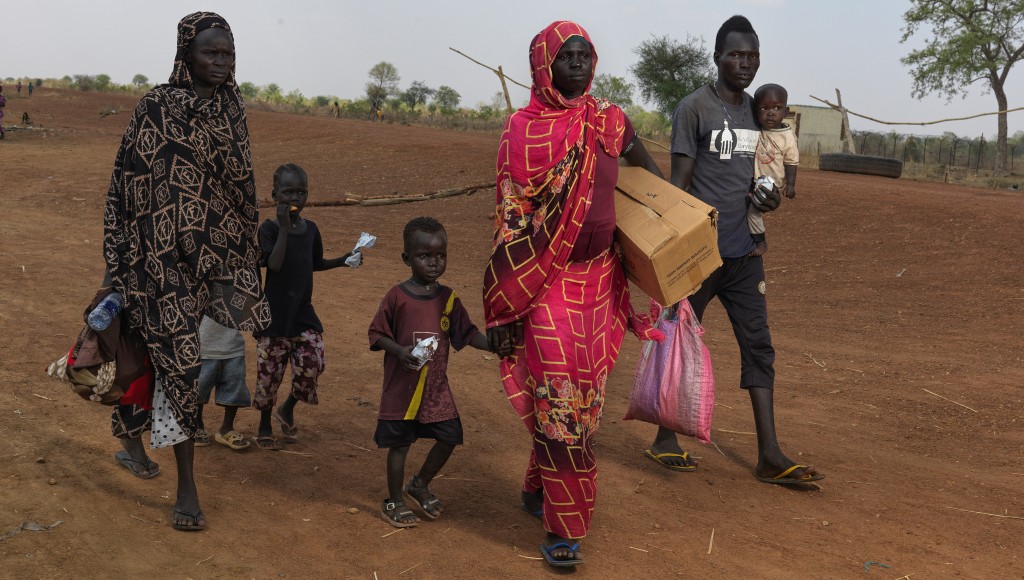
A displaced family fleeing to conflict in Sudan
Occupied Palestinian Territories
Famine in Gaza was confirmed in August 2025, with:
- 641,000 people facing catastrophic hunger
- 1.14 million people facing emergency hunger
Child malnutrition is also at dangerous levels, with 132,000 children facing acute malnutrition up until July 2026.
An Action Against Hunger nutrition staff member who worked in Gaza shared:
“Breastfeeding and pregnant women face double the risk: their bodies are exhausted from pregnancy and childbirth, and in return they face harsh hunger, prolonged deprivation, and a severe lack of all essential health and nutrition necessities.”
Hunger is also getting worse in the West Bank, where violence is continuing to escalate and crop destruction is increasing.
Causes of hunger in Occupied Palestinian Territories
- Conflict: 86% of people in Gaza live within militarized areas or under displacement orders away from food aid
- Destruction of infrastructure: approximately 86% of croplands in Gaza have been destroyed or damaged
- Rising food prices: the price of basic food items are unaffordable and people’s livelihoods have been lost
Afghanistan
An estimated 9.5 million people in Afghanistan were projected to face crisis or worse food insecurity between May and October 2025, including 1.6 million at risk of emergency hunger.
Malnutrition in women and children saw an increase in 2025, with 4.7 million needing treatment. Last year, there was a nearly 29% increase in pregnant and breastfeeding women being admitted for malnutrition.
Action Against Hunger teams found that 98% of households in the Shar-e-Buzurg District of Afghanistan reported a poor food consumption score, which measures food diversity and frequency.
In Helman Province, our teams observed the following:
“We were approached by crowds of people, one man responsible for a family of nine had not eaten meat for more than three months, another person had gone without food for three consecutive days.”
Causes of hunger in Afghanistan
- Humanitarian funding shortfalls: 22.9 million people needed aid in 2025, yet cuts have forced organisations like Action Against Hunger to stop life-saving programmes
- Extreme weather: widespread drought and localised flooding have destroyed crops and livelihoods
- Climate shocks: a 6.5 magnitude earthquake hit Eastern Afghanistan in August 2025, with 1.3 million livestock and food stocks impacted
- Economic stress: the economy in Afghanistan is turbulent and unemployment is high
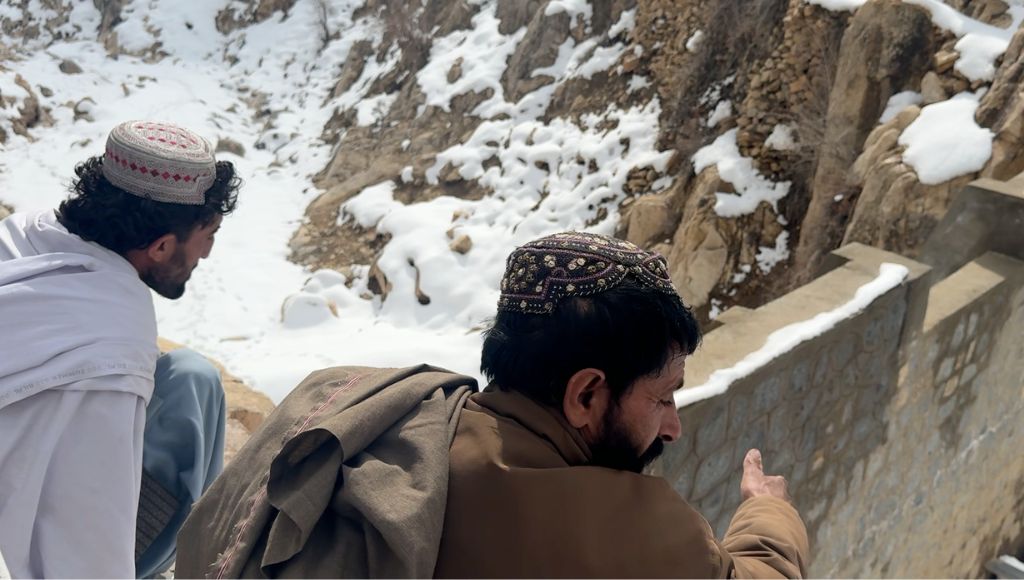
Farmers face extreme weather in Daikundi, Afghanistan.
Yemen
In Yemen, 18.1 million people are projected to face high levels of food insecurity between September 2025 and February 2026, including:
- 41,000 people facing catastrophic hunger
- 5.5 million people facing emergency hunger
Our team works with communities facing hunger across Yemen. Action Against Hunger’s Director of Middle East Operations, Anne Garella, shared words on the situation:
“The intensification of hostilities in the north [of Yemen] has not only aggravated the humanitarian situation by disrupting markets – including food and fuel imports – but also the delivery of humanitarian aid.”
Women and children in Yemen are more vulnerable to malnutrition, with 55% of children malnourished in addition to 1.7 million pregnant and breastfeeding women.
Causes of hunger in Yemen
- Economic crisis: a deteriorating economy is continuing to put livelihoods at risk and make food unaffordable for many
- Ongoing conflict: 2025 marked 10 years of conflict in Yemen, displacing 5 million people and destroying markets and food supply chains
- Extreme weather: floods and droughts are heavily impacting agriculture, leading to crop loss and infrastructure damage
- Underfunding: 19.5 million people in Yemen need humanitarian aid, but only 13% of required funding has been secured
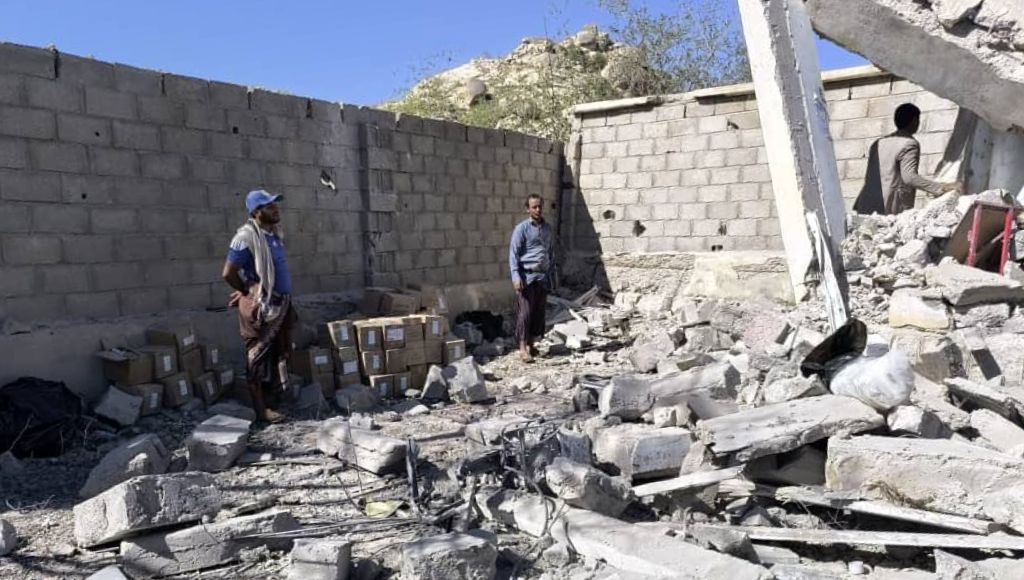
Destruction of healthcare facility in Yemen, where conflict is fuelling hunger
South Sudan
Around 7.7 million people in South Sudan were projected to face crisis-phase food insecurity between March and June 2026, with:
- 83,000 people facing catastrophic hunger
- 2.4 million people facing emergency hunger
The UN expects catastrophic hunger in South Sudan to spread, especially in the Upper Nile, Jonglei and Unity regions of the country.
The arrival of returnees and refugees from Sudan is ongoing. Lack of resources to support displaced people is putting pressure on existing South Sudanese communities, who are already struggling to find enough food to survive.
Child malnutrition is also at a high rate in South Sudan, with 2.3 million children under 5 acutely malnourished.
Causes of hunger in South Sudan
- Economic instability: food prices are seven times higher than when conflict begun
- Conflict: violence is escalating across South Sudan, disrupting livelihoods, destroying agriculture and leaving 2 million internally displaced
- Floods: increased rainfall was set to impact 1.6 million people at the end of 2025, with sanitation at risk and food sources destroyed
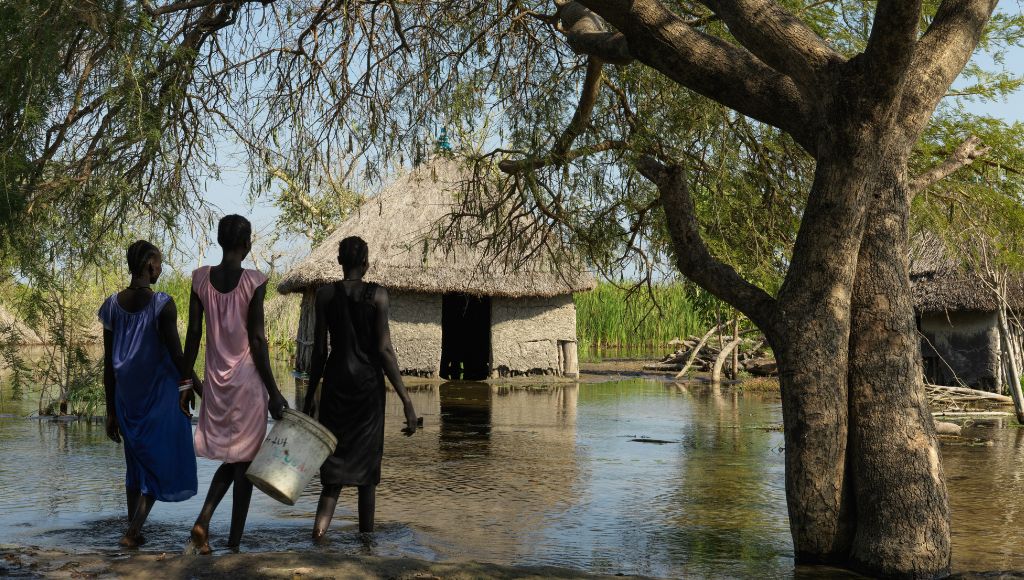
Women impacted by floods in Old Fangak, South Sudan
Haiti
Approximately 5.9 million people in Haiti were projected to face crisis or worse food insecurity between March and June 2025 – the UN’s highest number on record for Haiti – with 2 million people facing emergency hunger.
People in Haiti live in extreme poverty, with multiple causes of hunger intersecting making food security worse. Child malnutrition is also increasing, with 288,000 children at risk.
Causes of hunger in Haiti
- Escalating violence: 1.4 million people had fled their homes as of June 2025, with many living in displacement camps with limited access to food
- Extreme weather: heavy rain in September 2025 destroyed crops and wiped out livestock
- Economic instability: food inflation reached 35% in September 2025, leaving many families unable to afford food
- Lack of humanitarian funding: a large portion of food aid and other humanitarian assistance halted in March 2025 due to funding gaps
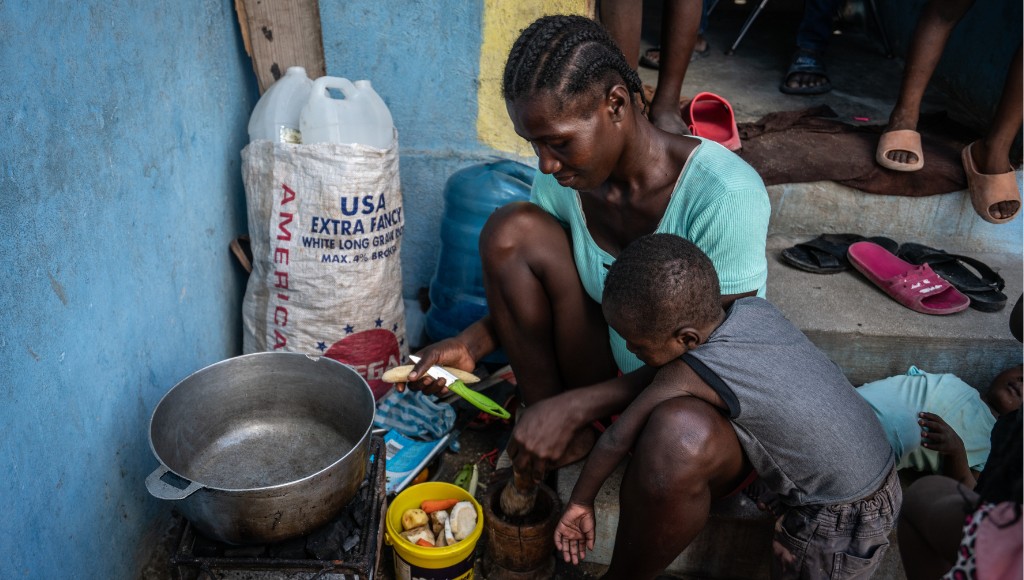
A displaced family preparing food in Port-au-Prince, Haiti
Mali
An estimated 1.5 million people in Mali were projected to face crisis or worse food insecurity between June and August 2025, including:
- 2,600 people at risk of catastrophic hunger
- 64,200 people at risk of emergency hunger
Catastrophic hunger is expected in Ménaka, Mali and emergency levels are projected in the Mopti, Gao, Tombouctou and Kidal and food insecurity is expected to get worse.
Causes of hunger in Mali
- Ongoing conflict: displacement driven by violence is disrupting livelihoods and agriculture
- High food prices: families in conflict-affected areas are facing increasing food costs, with food baskets up to 152% higher above national average
- Crop loss: less rain than expected fell at the end of 2025, impacting rice yields in an agricultural industry heavily impacted by conflict
- Funding shortages: there is a 75% funding gap in humanitarian assistance needed in Mali
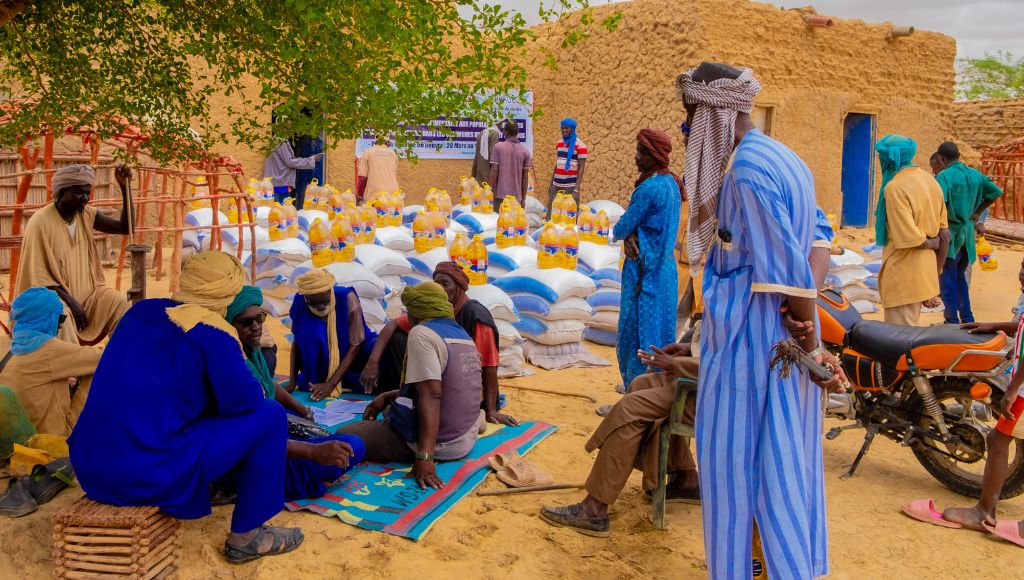
Displaced families collecting aid following floods in Timbuktu, Mali
Countries of very high concern
The UN’s hunger hotspots report has declared that countries where hunger is of very high concern are Democratic Republic of Congo (DRC), Myanmar, Syria and Nigeria.
Food insecurity needs to be urgently addressed in very high concern countries in order to save lives, prevent loss of livelihoods and stop hunger from getting worse.
Democratic Republic of Congo (DRC)
The Democratic Republic of Congo is facing its highest level of food insecurity in 5 years. More than 27.7 million people in DRC are expected to face crisis or worse levels of hunger between January and June 2025.
Malnutrition is also more prevalent – almost 4.5 million children under 5 are risk of acute malnutrition by mid-2025.
Increasing hunger levels in Democratic Republic of Congo are being fuelled by:
- Escalating conflict: by July 2025, 5.8 million people had left their homes due to violence, losing their livelihoods and ability to afford food
- Infrastructure destruction: conflict in DRC is significantly disrupting agriculture and food supply chains
- Floods: ongoing floods continue to disrupt agriculture and destroy crops
Myanmar
In Myanmar, 16.7 million people were expected to face high levels of food insecurity at the end of 2025, including 1 million people facing emergency hunger. Malnutrition is also worsening – 540,000 children were projected to be malnourished in 2025.
Hunger in Myanmar is being driven by:
- Monsoon flooding: repeated flooding has driven widespread crop and livestock loss
- Rising food prices: inflation remains high, with the highest food price rises felt in conflict-impacted areas
- Lack of funding: Humanitarian aid is significantly underfunded and extreme access constraints are making delivering food aid more challenging
Nigeria
Over 30.6 million people in Nigeria are at risk of reaching crisis levels of hunger between June and August 2025, according to a UN analysis from March 2025. 15.6 million of those people live in Northwest and Northeast Nigeria, the areas worst impacted by conflict.
Nigeria is projected to face worsening child malnutrition, with over 5.4 million children at risk of malnutrition by April 2025. 788,000 breastfeeding and pregnant women were also projected to face malnutrition over the same period.
Hunger and malnutrition in Nigeria is being fuelled by:
- Intensifying conflict: 3.6 million people were internally displaced as of September 2025, and food systems are being severely effected
- Economic challenges: high food prices are fuelling rising inflation
- Extreme weather: heavy rain has triggered floods that have destroyed crops in some areas, with below average rainfall impacting crop yields in others
Somalia
In Somalia, 4.4 million people were projected to face crisis or worse hunger by December 2025, including 921,000 facing emergency hunger.
The country has the highest humanitarian crisis risk in the world due to the INFORM index, which measures humanitarian crisis risk and informs organisations like Action Against Hunger in preparing, preventing and responding to crises.
Around 1.85 million children in Somalia are at risk of acute malnutrition between July 2025 and July 2026. Abdirahman, a Doctor treating malnourished children at a health centre supported by Action Against Hunger in Somalia, shared:
“The issue of malnutrition in the country is steadily increasing day by day. This is due to the crises in the country – whether droughts or conflicts – which continue to occur in various forms. As a result, the number of malnourished children continues to rise.” – Abdirahman, Doctor in Deyniile district of Somalia
Other hunger hotspots
The hunger crises in the following countries are deteriorating quickly and at risk of becoming of very high concern:
- Burkina Faso
- Chad
- Kenya
- Rohingya refugees in Bangladesh
Source: Hunger Hotspots: Early warnings on acute food insecurity, November 2025 to May 2026 outlook – Food and Agriculture Organization (FAO) of the United Nations (UN) and the World Food Programme (WFP).
Page last updated: 26 February 2026


